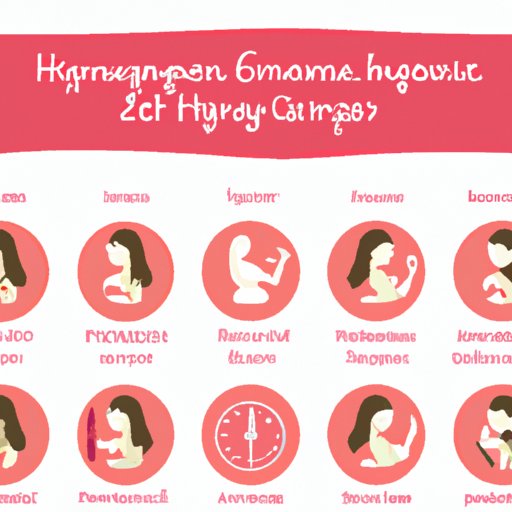
I. Introduction
For women who are trying to conceive or suspect that they might be pregnant, the wait for pregnancy symptoms can be a time of anxiety and uncertainty. It can be difficult to know when to expect these symptoms and how to recognize them when they do appear. In this article, we aim to provide a comprehensive guide to early pregnancy symptoms, their timeline, and how to cope with the waiting period.
II. Exploring the Early Signs of Pregnancy: When Do They Typically Appear?
Early pregnancy symptoms can appear within days after conception, although they may not be noticeable until a week or two after the missed period. The most common early signs of pregnancy include fatigue, nausea, sore breasts, and spotting or cramping.
Fatigue is one of the earliest pregnancy symptoms and can start as soon as a week after conception. Nausea and morning sickness can begin a few weeks after conception and can last throughout the pregnancy. Sore breasts can also be an early symptom and may feel tender or swollen. Lastly, spotting or mild cramping can occur when the embryo implants in the uterus, about 6-12 days after conception.
III. The Wait for Pregnancy Symptoms: Understanding the Different Timelines
The timeline for pregnancy symptoms can vary for different women and can also depend on various factors such as age, lifestyle, and genetics. Some women may experience symptoms soon after conception, while others may not experience any until weeks after a missed period.
Another possible reason for the differences in timelines is the level of hCG hormone. The hormone human chorionic gonadotropin (hCG) is produced by the placenta after the fertilized egg implants into the uterus. The level of hCG hormone in the body can vary from woman to woman. The higher the level of hCG hormone, the earlier the symptoms may appear.
IV. How to Recognize Early Pregnancy Symptoms and Differentiate Them from Other Conditions
It’s important to note that some early pregnancy symptoms can be similar to symptoms of other conditions. For example, fatigue and nausea can also be symptoms of stress or other illnesses. Therefore, it’s essential to pay attention to other signs of pregnancy, such as missed periods, changes in appetite, and mood swings.
If you suspect that you might be pregnant, it’s essential to take a home pregnancy test to confirm pregnancy and follow up with a medical professional for further evaluation and advice. They can also help you to differentiate pregnancy symptoms from other conditions.
V. The Science of Pregnancy Symptoms: What Happens to Your Body in the First Few Weeks
During the first few weeks of pregnancy, the female body undergoes a series of physiological changes that can cause pregnancy symptoms. The levels of estrogen and progesterone increase, which leads to changes in the uterus lining, and blood flow to the uterus also increases. As a result, women may experience changes in their appetite, mood swings, and more frequent urination.
Moreover, the digestive system may slow down during pregnancy, leading to constipation and bloating. The heightened sense of smell and taste can also be attributed to the hormones that cause nausea and morning sickness. Similarly, sore breasts are a result of hormonal changes in the body that cause the milk ducts to enlarge.
VI. The Emotional Journey of Early Pregnancy: Coping with Waiting for Symptoms to Show Up
Waiting for pregnancy symptoms to show up can be emotional, uncertain, and overwhelming. It’s essential to discuss your feelings with your partner, close family members or friends, or a professional counselor. They can listen and advise you on how best to cope with your emotions. Some other things that can help include self-care, meditation, and relaxation techniques.
VII. Common Misconceptions about Early Pregnancy Symptoms and Why They Can Be Tricky to Spot
One of the misconceptions about early pregnancy symptoms is that they always occur before a missed period. However, it’s not uncommon for women to experience these symptoms after a missed period. This is because the level of hCG hormone produced after implantation can vary in different women, making it less noticeable in some cases.
Additionally, superficial factors such as stress, age, lifestyle, and genetics can also influence the timeline and severity of early pregnancy symptoms. Hence, it’s essential to recognize that this process can differ from person to person, and some women may not experience any symptoms throughout their pregnancy.
VIII. Conclusion
The wait for pregnancy symptoms can be a time of excitement and anxiety for women who are trying to conceive. However, with this guide, we hope to provide helpful insights into early pregnancy symptoms, their timeline, and how to deal with the waiting period. Remember, if you suspect that you might be pregnant, take a home pregnancy test and seek help from a medical professional. Stay positive and take care of your physical and emotional health during this time.





